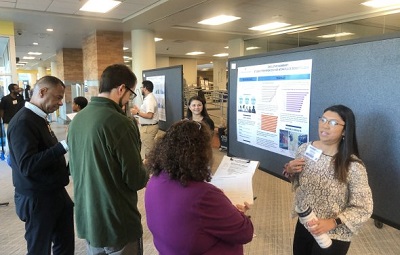Examination of Gender as a Moderating Factor in the Relationship between Sexual Trauma and Disordered Eating
Description/Abstract/Artist Statement
Strong associations between childhood sexual abuse and disordered eating (DE) are well established. Previous research also suggests an association between adolescent and adult sexual abuse (SA) and harassment (SH) and DE within the female college population. Research considering the role of gender in this relationship is lacking. The present study sought to fill this gap by examining the role of gender on the relationship between SA/SH experienced during adolescence/adulthood and DE within a diverse college sample (N=846, Mage=22.55, SD=6.92; 43.9% White, 35.9% Black). Measures used in this study included the Traumatic Life Events Questionnaire, the Three-Factor Eating Questionnaire (TFEQ) survey, and a demographic questionnaire. Linear regression analyses tested the relationships between frequency of adolescent and adult SA/SH and the three domains of DE measured via the TFEQ: cognitive restraint, uncontrollable (binge) eating, and emotional eating, all of which were significant (��=.141, t=4.11, pt=2.65, p=.008; ��=.105, t=3.06, p=.002, respectively). Accounting for race, gender significantly moderated the relationship between adolescent/adult SA/SH and binge eating (��=-.274, t=-2.19, p=.029) and emotional eating (��=-.443, t=-3.56, pt=-1.31, p=.191). Interestingly, the effect of SA/SH on binge eating and emotional eating was stronger among men compared to women. These findings suggest that men who experience sexual trauma in adolescence and adulthood are at greater risk for binge and emotional eating compared to their female counterparts. This data speaks to the increased need for screening of DE amongst male SA survivors.
Faculty Advisor/Mentor
Dr. Sage Hawn
Faculty Advisor/Mentor Department
Psychology
College Affiliation
College of Sciences
Presentation Type
Poster
Disciplines
Clinical Psychology | Health Psychology
Session Title
Poster Session
Location
Learning Commons Lobby @ Perry Library
Start Date
3-30-2024 8:30 AM
End Date
3-30-2024 10:00 AM
Upload File
wf_yes
Examination of Gender as a Moderating Factor in the Relationship between Sexual Trauma and Disordered Eating
Learning Commons Lobby @ Perry Library
Strong associations between childhood sexual abuse and disordered eating (DE) are well established. Previous research also suggests an association between adolescent and adult sexual abuse (SA) and harassment (SH) and DE within the female college population. Research considering the role of gender in this relationship is lacking. The present study sought to fill this gap by examining the role of gender on the relationship between SA/SH experienced during adolescence/adulthood and DE within a diverse college sample (N=846, Mage=22.55, SD=6.92; 43.9% White, 35.9% Black). Measures used in this study included the Traumatic Life Events Questionnaire, the Three-Factor Eating Questionnaire (TFEQ) survey, and a demographic questionnaire. Linear regression analyses tested the relationships between frequency of adolescent and adult SA/SH and the three domains of DE measured via the TFEQ: cognitive restraint, uncontrollable (binge) eating, and emotional eating, all of which were significant (��=.141, t=4.11, pt=2.65, p=.008; ��=.105, t=3.06, p=.002, respectively). Accounting for race, gender significantly moderated the relationship between adolescent/adult SA/SH and binge eating (��=-.274, t=-2.19, p=.029) and emotional eating (��=-.443, t=-3.56, pt=-1.31, p=.191). Interestingly, the effect of SA/SH on binge eating and emotional eating was stronger among men compared to women. These findings suggest that men who experience sexual trauma in adolescence and adulthood are at greater risk for binge and emotional eating compared to their female counterparts. This data speaks to the increased need for screening of DE amongst male SA survivors.


